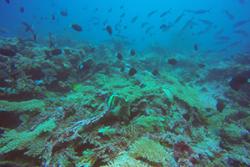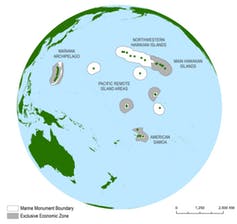We opened up all our data on coral reefs – more scientists should do the same to protect habitats
MVI_2302 from Adel Heenan on Vimeo.
![]() This article by Adel Heenan, Postdoctoral fellow, School of Ocean Sciences, Bangor University and Ivor D. Williams, Coral Reef Ecologist, National Oceanic and Atmospheric Administration was originally published on The Conversation. Read the original article.
This article by Adel Heenan, Postdoctoral fellow, School of Ocean Sciences, Bangor University and Ivor D. Williams, Coral Reef Ecologist, National Oceanic and Atmospheric Administration was originally published on The Conversation. Read the original article.
Coral reefs are critically important to the world but despite the ongoing efforts of scientists and campaigners, these stunningly beautiful ecosystems still face a variety of threats. The most pervasive is, of course, climate change, which is putting their very future in jeopardy.
 A healthy deep coral reef: John TurnerClimate change is a complex, worldwide problem that needs a global solution. One part of which is good monitoring systems, that operate at a large scale. Broad scale datasets from these systems are required to understand how vulnerable ecosystems like coral reefs are changing, and to separate that information from natural variation.
A healthy deep coral reef: John TurnerClimate change is a complex, worldwide problem that needs a global solution. One part of which is good monitoring systems, that operate at a large scale. Broad scale datasets from these systems are required to understand how vulnerable ecosystems like coral reefs are changing, and to separate that information from natural variation.
Often, however, scientists that collect coral reef monitoring data do so in isolation. They work on independent research projects, or for relatively small programmes with specific local agenda, and so don’t always make their data available to the scientific community. The pressure on academic researchers to be the first to publish their findings also disincentives data sharing. So there can be a conflict of interest between the motivations of an individual scientist and the larger advancement of science.
More practically, getting data ready to share is time consuming, particularly when there aren’t standardised monitoring procedures or a good data management infrastructure in place. In the absence of good management, data can simply be lost as people move on, taking lab books, data sheets and external hard drives with them.
But these barriers can be overcome. Through, for example, open access journals that publish scientifically valuable datasets. Peer-reviewed, citable datasets with standardised meta-data promotes sharing and reusability, while also recognising the researchers behind it.
Given the now urgent need to find science-based solutions for coral reefs, we believe the benefits of open data far outweigh the costs. This is one of the reasons we recently published our entire dataset of coral reef habitats and fish assemblages in the western central Pacific.
Counting fish at Jarvis Island, one of the most remote coral reefs on the planet (Kevin Lino/NOAA Fisheres)
Pooling data
Our dataset was collected by scientific divers from the US national oceanic and atmospheric administration between 2010 and 2017. They were part of the interdisciplinary team that operates from NOAA ships to collect physical, chemical and biological data for the pacific reef assessment and monitoring programme. For seven years, these researchers surveyed fish assemblages and coral reef habitats at 39 islands and atolls in the United States affiliated western central Pacific.
The areas studied ranged from the remotest islands in the central Pacific – hundreds of kilometres from the nearest human civilisations – to highly populated, developed and urbanised islands such as Oahu and Guam.
These islands also have different biophysical conditions, such as temperature. This means that we have been able to quantify different threats relative to the natural background variability caused by environmental conditions. For instance, we can now understand the true effect of human depletion on coral reef fishes. We have also been able to set reasonable expectations for what a healthy reef looks like in different locations.
When multiple large data sets like this are pooled, they become even more powerful, allowing researchers to tackle key questions, such as where coral reef “bright spots” are and why they are thriving.
Scientific advancements
 The areas studied by the NOAA divers: NOAA Fisheries, Author providedBy making all data easily available like ours is, and working to improve comparability, we can speed up the scientific pace to better understand and manage coral reefs. Though we were required to make the NOAA data available under the United States Open Data Policy, we believe it is important for the wider coral reef community to fully embrace this ideal. Coral reefs are so widespread that no one programme can hope to gather data across most of their range. Linking large and small-scale programmes will improve the value of both: large datasets can give the big picture context, while localised programmes can be more intensive or regularly repeated.
The areas studied by the NOAA divers: NOAA Fisheries, Author providedBy making all data easily available like ours is, and working to improve comparability, we can speed up the scientific pace to better understand and manage coral reefs. Though we were required to make the NOAA data available under the United States Open Data Policy, we believe it is important for the wider coral reef community to fully embrace this ideal. Coral reefs are so widespread that no one programme can hope to gather data across most of their range. Linking large and small-scale programmes will improve the value of both: large datasets can give the big picture context, while localised programmes can be more intensive or regularly repeated.
One landmark study, for example – which used open datasets from different sources – found that the majority of coral reefs are fished to under half of their maximum population. So a range of management target benchmarks were established. Another compiled 25 different datasets to report on the status of coral reef fish biomass at 37 different districts in Hawaii, covering almost the entire archipelago’s coastline. Not only does this collated data help local reef management, but it can be used for marine spatial planning and for assessing effectiveness of reef management elsewhere.
There are a certainly a number of challenges to bringing different datasets together. Scientists will have to work together to create a core set of community standards for how to calibrate across different methods, and what to monitor. But by doing this, the information we gather will be far more useful in addressing the coral reef crisis. A commitment to open data is an important part of this.
Publication date: 29 January 2018
